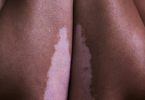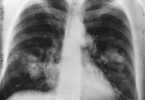February is National Cancer Prevention Month and time to learn more about this dreaded disease. One of the commonly held myths is that Black people do not get skin cancer. People tend to believe that the melanin in darker skin protects us from developing skin cancer. While this body’s natural pigment protects the skin from damaging ultraviolet rays, we are not immune to skin cancer.
How Skin Cancer is Common in Black Community
Skin cancer is more common in the Black community than people tend to think. Statistics indicate that 1 in every 5 people will get skin cancer in their lifetime. This can be in the form of basal cell carcinoma, melanoma, and squamous cell carcinoma. Although people assume the rate is lower in Black community than in those with lighter skin complexions, skin cancer still affects many Black people. Statistics by the American Cancer Society found that just 1 case of melanoma cancer was reported per 100,000 Black people in 2018. This was relatively lower than the 25 cases that occurred per 100,000 in white people, constituting 25 times the rate. The statistics, however, do not change the fact that Black people develop skin cancer.
Causes of Skin Cancer in Black People
Skin cancer in Black people is usually caused by exposure to ultraviolet (UV) radiation from the sun and tanning beds. These are the same contributing factors among individuals with lighter skin. Although dark skin offers some protection against UV rays, long-term and excessive exposure can damage skin cells, contributing to skin cancer.
Symptoms of Skin Cancer in Black People
The main symptoms of skin cancer in darker skin are changes in the skin’s texture and appearance. The symptoms may appear in different parts of the body depending on the amount of exposure to the sun’s UV rays. Some of the parts that tend to suffer more damage include:
- Scalp
- Face
- Ears
- Neck and shoulders
- Arms and hands
- Chest
One of the unique factors of skin cancer in darker skin is that it only shows in certain parts of the body. It may affect the bottom of the foot, palms, lower legs, under a fingernail or toenail, and groin. To get a better understanding of the signs of cancer on the skin, apply the ABCDE formula to conduct a self-assessment:
- Asymmetry: Normal moles are often circular, but asymmetrical for skin cancer. The shape and color may also be irregular
- Border: An irregular or rough border may be a sign of cancer
- Color: Look for irregular color patterns such as darker moles in one part and light in another
- Diameter: Larger growths or lesions are more likely to be cancerous. Look for any growths that are larger than a pea-size
- Evolving: Cancer grows rapidly. An early sign would be a quick change in size, shape, or color in a part of your skin
The ABCDE works as a guide to evaluating the health of your skin. If you notice an unusual patch of skin anywhere on your body, you should contact a doctor.
Risks Associated with Skin Cancer in Black Community
Detecting skin cancer early is key to better treatment outcomes. Unfortunately, we tend to be diagnosed with skin cancer at later stages. The American Academy of Dermatology (ADD) found that nearly 25% of melanomas in Black people are often diagnosed after the cancer cells have already spread. This leads to late treatment and poorer outcomes. In another 2019 study, it was found that the 5-year survival rate for melanoma was 66.2% among Black people compared to 90.1% in white Americans. The later diagnosis is often associated with factors like:
- Lower awareness of the symptoms of skin cancer
- Less frequent use of sunscreen
- Lack of access to healthcare
Tips to Prevent Skin Cancer in Black People
People of color, including those with black and brown skin can reduce the risk of cancer by making few changes in their lifestyle. The goal is to reduce your exposure to harmful UV rays and keep the skin as healthy as possible.
- Wear Sunscreen Daily
This goes without saying. Sunscreen goes a long way in protecting your skin especially when you are exposed to the sun for a long time. Although melanin may offer protection, wearing a broad-spectrum sunscreen every day of at least SPF 30 or higher provides an additional layer of protection. It is also helpful to avoid being outside in the scorching sun between 10 a.m. and 4 p.m.
- Stay in the Shade
Ultraviolet (UV) rays are the leading cause of skin cancer in Black people. The invisible radiation can damage skin cells and cause cancer. To protect yourself from the exposure, stay in the shade whenever possible and wear clothes that cover more skin.
- Check Your Skin
A self-exam is a full body screening of your skin that can be done at home to determine the health of your skin. You’ll need a full-length mirror as well as a hand mirror to thoroughly check your skin from head to toe. It is recommended that you do this at least once a month will give. The examination involves looking for:
- New dark spots (or changes in size and shape of the existing ones)
- A rough patch of skin
- A sore that won’t heal (usually heals and returns)
- A dark line underneath a toenail or fingernail
4. Schedule an Annual Checkup
As mentioned earlier, the major problem with skin cancer in Black people is that it tends to be diagnosed in later stages. To avoid this, go for an annual checkup, especially if your family has a history of skin cancer. Include a visit to a dermatologist because they are more qualified to diagnose and also treat skin disorders.
Skin Cancer Diagnosis
You can start skin cancer diagnosis at home. Check your skin every month for symptoms, and contact your doctor about anything that may look suspicious. The doctor will then perform a skin exam in a process that involves using a scope to look at unusual skin growths.
The scope exam will determine whether the growth resembles cancer. They will then order a biopsy to ascertain whether the cells in the growth are cancerous. A small sample of the growth is sent to the lab where experts examine it under a microscope.
How to Treat Skin Cancer in Darker Skin
Treating skin cancer in Black people usually depends on different factors. Factors such as the type of skin cancer and its stage will determine the recommended procedure. The doctor will also consider the location of the cancer in the body before treatment can begin.
In the early stages, surgery is mostly used as a treatment for different types of skin cancer. The procedures help to curb the spread of cancer to other areas and eliminate it from the body. For later diagnosis or when the person has melanoma, the recommended treatment may involve:
- Chemotherapy
- Radiation
- Additional surgeries to remove skin cancer that has spread to other parts of the body
- Targeted cancer drugs
- Topical treatments to kill cancer
Skin cancer is as common in the Black community as much as in other races. Although the rate is relatively low, the disease still affects a huge number of people with darker skin. The major problem, however, is later diagnosis. This makes it complicated to treat skin cancer effectively in Black people. Therefore, conducting self-examination and going for checkups, especially for those with a family history of skin cancer can go a long way in early detection and prevention.
Learn More
Skin Cancer In People Of Color. https://www.aad.org/diseases/skin-cancer/skin-cancer-people-of-color
Skin Cancer. https://www.aad.org/media/stats-skin-cancer
Cancer Statistics At a Glance. https://gis.cdc.gov/Cancer/USCS/#/AtAGlance/
Skin Cancer Concerns in People of Color: Risk Factors and Prevention. https://www.ncbi.nlm.nih.gov/pmc/articles/PMC5454668/
5 simple steps to help prevent skin cancer. https://www.mayoclinichealthsystem.org/hometown-health/speaking-of-health/simple-steps-to-prevent-skin-cancer
Skin Cancer in People of Color. https://www.skincancer.org/skin-cancer-information/skin-cancer-skin-of-color/
Melanoma Among Non-Hispanic Black Americans. https://www.ncbi.nlm.nih.gov/pmc/articles/PMC6638592/
Can Black People Get Skin Cancer? 6 Surprising Answers. https://shareing-careing.org/can-black-people-get-skin-cancer-6-surprising-answers/








